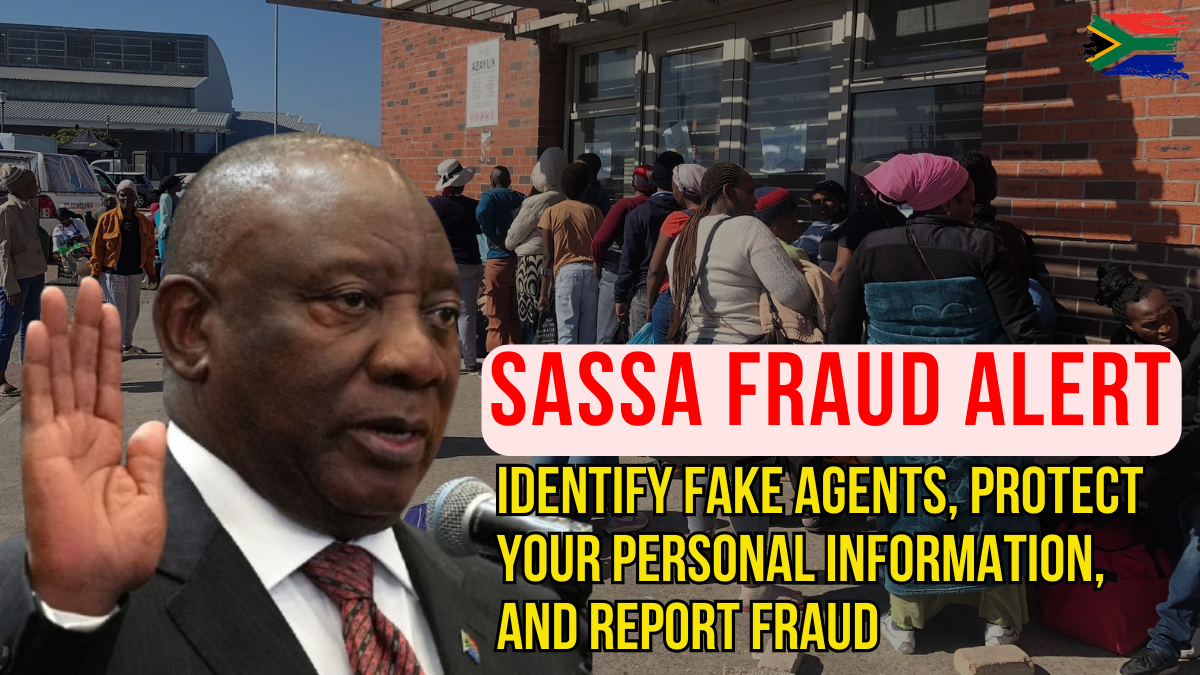The South African Social Security Agency (SASSA) has issued a critical fraud warning for 2025 after a sharp increase in scams targeting social grant recipients. Fraudsters posing as SASSA officials are attempting to extort upfront fees for “processing” or “fast-tracking” grants.

Officials are urging beneficiaries to remember: All SASSA services are completely free. Any demand for money is a scam. This guide explains how to identify fake agents, protect your personal information, and report fraud before it’s too late.
Summary Table: SASSA Fraud Alert
Field |
Details |
|---|---|
Issue |
Fake agents posing as SASSA officials |
Scam Tactics |
Upfront fees, fake grants, threats, data theft |
SASSA’s Position |
All services are free |
Official Helpline |
0800 60 10 11 |
Impact |
Financial loss, emotional distress, loss of trust |
Reporting Channels |
SASSA hotline, SAPS, Legal Aid SA |
Official Website |
Recognizing the Signs of SASSA Grant Scams
Criminals are using phone calls, WhatsApp messages, SMS texts, and even in-person visits to trick recipients into paying fake “service fees.” They often appear professional and convincing.
Common scam tactics include:
- Requests for upfront payments to process or speed up grant payouts.
- Offers of non-existent grants that require a “registration” or “service” fee.
- Demands for personal details like your ID number, SASSA card PIN, or banking information.
- Threats that your grant will be cancelled if you don’t comply.
- Use of fake uniforms, forged ID cards, or SASSA-branded forms.
Important:
SASSA has confirmed that no official will ever request payment for grant applications, processing, or approvals.
How to Protect Yourself from SASSA Grant Fraud
1. Verify All Communication
If you’re contacted by someone claiming to be a SASSA representative:
- Call the official SASSA toll-free hotline at 0800 60 10 11 to confirm.
- Never rely on phone numbers or emails provided by the person contacting you.
2. Never Share Your Personal Information
Do not give out:
- ID number
- SASSA card PIN
- Banking details
3. Report Fraud Immediately
If you’ve been targeted or already paid money:
- Notify SASSA immediately.
- File a case with the South African Police Service (SAPS).
4. Spread the Word
Inform family, friends, and neighbors, especially elderly beneficiaries who may be less aware of digital scams.
The Real Impact of SASSA Grant Scams
Grant fraud is not just about financial loss—it also causes emotional distress and damages trust in public services.
Key impacts include:
- Loss of essential funds for food, healthcare, and transport.
- Increased fear and anxiety about receiving future payments.
- Reluctance to engage with legitimate SASSA processes.
- Victims often being targeted again by other fraudsters.
Where to Report and Get Help
If you suspect a scam or have been a victim, use these resources:
Resource |
Contact Info |
|---|---|
SASSA Hotline |
0800 60 10 11 |
Legal Aid South Africa |
0800 110 110 |
Local NGOs |
Visit your nearest community center |
SAPS (Police) |
Report fraud in person or online |
You can also check SASSA’s official website for the latest fraud alerts: www.sassa.gov.za
Frequently Asked Questions (FAQs)
Q1. How do I know if a call from SASSA is genuine?
Ans. Always verify through SASSA’s official hotline or by visiting a local office.
Q2. What are the most common scam tactics?
Ans. Impersonating officials, demanding fake fees, and threatening to cancel grants.
Q3. What should I do if I’ve already paid someone?
Ans. Report to SASSA and the police immediately and provide all evidence.
Q4. Can I change my personal details online safely?
Ans. Yes, but only through the official SASSA portal or in person.
Q5. How can I protect my community?
Ans. Share verified alerts, especially with elderly beneficiaries.
Final Advice: Stay Alert, Stay Safe
The SASSA fraud warning 2025 is clear: no legitimate official will ask for payment. Any request for money in relation to a grant is a scam. By staying vigilant, verifying communications, and reporting suspicious activity, beneficiaries can protect their financial security and peace of mind.
For More Information Click Here